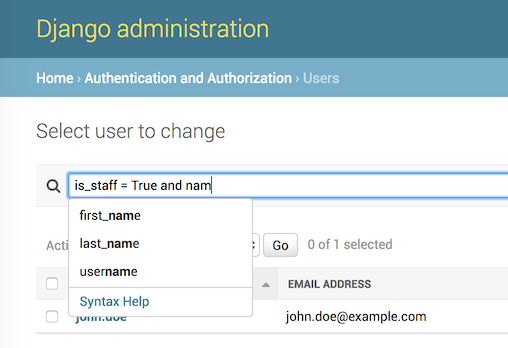Advanced search language for Django, with auto-completion. Supports logical operators, parenthesis, table joins, works with any Django models. Tested vs. Python 2.7, 3.5 and 3.6, Django 1.8 - 1.11. Auto-completion feature tested in Chrome, Firefox, Safari, IE9+.
See a video: DjangoQL demo
$ pip install djangoqlAdd 'djangoql' to INSTALLED_APPS in your settings.py:
INSTALLED_APPS = [
...
'djangoql',
...
]Add DjangoQLSearchMixin to your model admin, and it will replace standard
Django search functionality with DjangoQL search. Example:
from django.contrib import admin
from djangoql.admin import DjangoQLSearchMixin
from .models import Book
@admin.register(Book)
class BookAdmin(DjangoQLSearchMixin, admin.ModelAdmin):
passDjangoQL is shipped with comprehensive Syntax Help, which is available in Django admin (see Syntax Help link in auto-completion popup). Here's a quick summary:
DjangoQL looks close to Python syntax, however there're some minor differences. Basically you just reference model fields like you do it in Python code, apply comparison and logical operators and parenthesis. DjangoQL is case-sensitive.
- model fields: exactly as they are defined in Python code. Access
nested properties via
., for exampleauthor.last_name; - strings must be double-quoted. Single quotes are not supported.
To escape a double quote use
\"; - boolean and null values:
True,False,None. Please note that they can be combined with equality operators only, so you can writepublished = False or date_published = None, butpublished > Falsewill cause an error; - logical operators:
and,or; - comparison operators:
=,!=,<,<=,>,>=- work as you expect.~and!~- test that a string contains or not contains a substring (translated into__icontains); - test a value vs. list:
in,not in. Example:pk in (2, 3).
Schema defines limitations - what you can do with a DjangoQL query. If you don't specify any schema, DjangoQL will provide a default schema for you. It would recursively walk though all model fields and relations and include everything it could find in the schema, so users would be able to search through everything. However sometimes this is not what you want, either due to DB performance or security concerns. If you'd like to limit search models or fields, you should define a schema. Here's an example:
class UserQLSchema(DjangoQLSchema):
exclude = (Book,)
def get_fields(self, model):
if model == Group:
return ['name']
return super(UserQLSchema, self).get_fields(model)
@admin.register(User)
class CustomUserAdmin(DjangoQLSearchMixin, UserAdmin):
djangoql_schema = UserQLSchemaIn the example above we created a schema that excludes Book model
from search, and also limits available search fields for Group model
to name only. Instead of exclude you may also use include,
it would limit search to listed models only.
Another use case for schemas is values auto-completion. You can
optionally override .get_options() method to provide value
options for auto-completion widget. In the example below we use this
feature to provide options for Group names:
class UserQLSchema(DjangoQLSchema):
include = (User, Group)
def get_options(self, model, field_name):
if model == Group and field_name == 'name':
return Group.objects.order_by('name').values_list('name', flat=True)
@admin.register(User)
class CustomUserAdmin(DjangoQLSearchMixin, UserAdmin):
djangoql_schema = UserQLSchemaPlease note that all value options are loaded synchronously, so you should avoid large lists there.
Sure. You can add DjangoQL search functionality to any Django model using
DjangoQLQuerySet:
from django.db import models
from djangoql.queryset import DjangoQLQuerySet
class Book(models.Model):
name = models.CharField(max_length=255)
author = models.ForeignKey('auth.User')
objects = DjangoQLQuerySet.as_manager()With the example above you can perform search like this:
qs = Book.objects.djangoql(
'name ~ "war" and author.last_name = "Tolstoy"'
)It returns a normal queryset, so you can extend it and reuse if necessary. The following code works fine:
print(qs.count())Alternatively you can add DjangoQL search to any existing queryset, even if it's not an instance of DjangoQLQuerySet:
from django.contrib.auth.models import User
from djangoql.queryset import apply_search
qs = User.objects.all()
qs = apply_search(qs, 'groups = None')
print(qs.exists())Schemas can be specified either as a queryset option, or passed
to .djangoql() queryset method directly:
class BookQuerySet(DjangoQLQuerySet):
djangoql_schema = BookSchema
class Book(models.Model):
...
objects = BookQuerySet.as_manager()
# Now, Book.objects.djangoql() will use BookSchema by default:
Book.objects.djangoql('name ~ "Peace") # uses BookSchema
# Overriding default queryset schema with AnotherSchema:
Book.objects.djangoql('name ~ "Peace", schema=AnotherSchema)You can also provide schema as an option for apply_search()
qs = User.objects.all()
qs = apply_search(qs, 'groups = None', schema=CustomSchema)Completion widget is not tightly coupled to Django admin, so you can easily use it outside of admin if you want. Here is an example:
Template code, completion_demo.html:
{% load static %}
<!DOCTYPE html>
<html lang="en">
<head>
<meta charset="UTF-8">
<title>DjangoQL completion demo</title>
<link rel="stylesheet" type="text/css" href="{% static 'djangoql/css/completion.css' %}" />
<script src="{% static 'djangoql/js/lib/lexer.js' %}"></script>
<script src="{% static 'djangoql/js/completion.js' %}"></script>
</head>
<body>
<form action="" method="get">
<p style="color: red">{{ error }}</p>
<textarea name="q" cols="40" rows="1" autofocus>{{ q }}</textarea>
</form>
<ul>
{% for item in search_results %}
<li>{{ item }}</li>
{% endfor %}
</ul>
<script>
DjangoQL.DOMReady(function () {
DjangoQL.init({
// either JS object with a result of DjangoQLSchema(MyModel).as_dict(),
// or an URL from which this information could be loaded asynchronously
introspections: {{ introspections|safe }},
// css selector for query input. It should be a textarea
selector: 'textarea[name=q]',
// optional, you can provide URL for Syntax Help link here.
// If not specified, Syntax Help link will be hidden.
syntaxHelp: null,
// optional, enable textarea auto-resize feature. If enabled,
// textarea will automatically grow its height when entered text
// doesn't fit, and shrink back when text is removed. The purpose
// of this is to see full search query without scrolling, could be
// helpful for really long queries.
autoResize: true
});
});
</script>
</body>
</html>And in your views.py:
import json
from django.contrib.auth.models import Group, User
from django.shortcuts import render_to_response
from django.views.decorators.http import require_GET
from djangoql.exceptions import DjangoQLError
from djangoql.queryset import apply_search
from djangoql.schema import DjangoQLSchema
class UserQLSchema(DjangoQLSchema):
include = (User, Group)
@require_GET
def completion_demo(request):
q = request.GET.get('q', '')
error = ''
query = User.objects.all().order_by('username')
if q:
try:
query = apply_search(query, q, schema=UserQLSchema)
except DjangoQLError as e:
query = query.none()
error = str(e)
return render_to_response('completion_demo.html', {
'q': q,
'error': error,
'search_results': query,
'introspections': json.dumps(UserQLSchema(query.model).as_dict()),
})MIT
